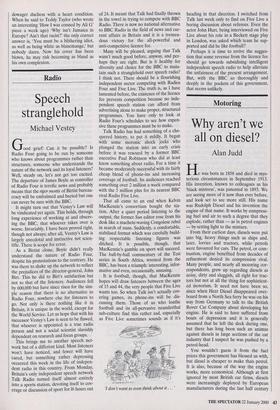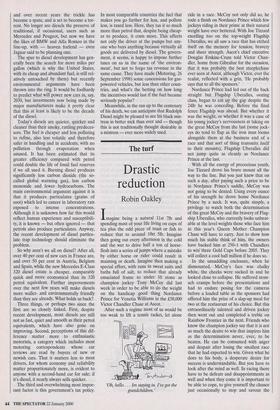Motoring
Why aren't we all on diesel?
Alan Judd
He was born in 1858 and died in mys- terious circumstances in September 1913. His invention, known to colleagues as his `black mistress', was patented in 1893. We are seeing more of it now than ever before, and look set to see more still. His name was Rudolph Diesel and his invention the engine of that name. It works by compress- ing fuel and air to such a degree that they explode, rather than — as in petrol engines — by setting light to the mixture.
From their earliest days, diesels were put into big, heavy things such as ships and, later, lorries and tractors, while petrols were favoured for cars. The petrol, or com- bustion, engine benefited from decades of refinement denied its compression rival. Many people, and nearly all motoring cor- • respondents, grew up regarding diesels as noisy, dirty and sluggish, all right for trac- tors but not at all the thing for sophisticat- ed motorism. It need not have been so, since when Herr Diesel disappeared over- board from a North Sea ferry he was on his way from Germany to talk to the British Rover Car Company about developing his engine. He is said to have suffered from bouts of depression and it is generally assumed that he left the deck during one, but there has long been such an animus against diesels in large sections of the car industry that I suspect he was pushed by a petrol-head.
You wouldn't guess it from the fuel prices this government has blessed us with, but diesel is cheaper to make than petrol. It is also, because of the way the engine works, more economical. Although at first ignored by most British car firms, diesels were increasingly deployed by European manufacturers during the last half century and over recent years the trickle has become a spate, and is set to become a tor- rent. No longer are diesels the preserve of traditional, if occasional, users such as Mercedes and Peugeot, but now we have the likes of BMW and Alfa Romeo in the line-up, with — heaven forfend — even Jaguar said to be planning one.
The spur to diesel development has gen- erally been the search for more miles per gallon (which is why the United States, with its cheap and abundant fuel, is still rel- atively untouched by them) but recently environmental arguments have been thrown into the ring. It would be foolhardy to predict what will power new cars in, say, 2030, but investments now being made by major manufacturers make it pretty clear that this at least is likely to be the decade of the diesel.
Today's diesels are quieter, quicker and cleaner than their smoky, rattling predeces- sors. The fuel is cheaper and less polluting to refine, also less volatile and therefore safer in handling and in accidents, with no pollution through evaporation when unused. It has been estimated that its greater efficiency compared with petrol could double the life of fossil fuel reserves if we all used it. Burning diesel produces significantly less carbon dioxide (the so- called global warming gas), less carbon monoxide and fewer hydrocarbons. The main environmental argument against it is that it produces particulates (grains of soot) which led to cancer in laboratory rats exposed to intense concentrations. Although it is unknown how far this would reflect human experience and susceptibili- ty, it is known — but often ignored — that petrols also produce particulates. Anyway, the recent development of diesel particu- late trap technology should eliminate the problem.
So why aren't we all on diesel? After all, over 40 per cent of new cars in France are, and over 50 per cent in Austria, Belgium and Spain, while the new Mercedes E-Class 320 diesel estate is cheaper, comparably quick and more economical than its 320 petrol equivalent. Further improvements over the next few years will make diesels more wallet- and environmentally friendly than they are already. What holds us back?
Three things, or perhaps two since the first are so closely linked. First, despite recent development, most diesels are still not as fast, quiet and smooth as their petrol equivalents, which have also gone on improving. Second, perceptions of this dif- ference matter more to enthusiastic motorists, a category which includes most motoring correspondents whose car reviews are read by buyers of new or newish cars. That it matters less to most drivers, for whom economy and reliability matter proportionately more, is evident to anyone with a second-hand car for sale; if it's diesel, it nearly always sells quicker.
The third and overwhelming most impor- tant factor is this government's tax policy. In most comparable countries the fuel that makes you go farther for less, and pollute less, is taxed less. Here, they tax it so much more than petrol that, despite being cheap- er to produce, it costs more. This affects not only the driver at the pumps but any- one who buys anything because virtually all goods are delivered by diesel. The govern- ment, it seems, is happy to impose further taxes on us in the name of 'the environ- ment', but not to forgo tax revenue in the same cause. They have made (Motoring, 26 September 1998) some concessions for gas- powered vehicles, but less than other coun- tries, and what's the betting on how long the incentives would last if the fuel became seriously popular?
Meanwhile, in the run up to the centenary of his death, we can anticipate that Rudolph Diesel might be pleased to see his black mis- tress in better nick than ever and — though this is not traditionally thought desirable in a mistress — ever more widely used.



























































 Previous page
Previous page